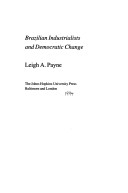To protect what they see as their interests, high-ranking business executives have been known to support brutal dictators. Given the economic power such executives wield, it is feasible that their leverage extends into the political sphere - even to the extent of causing regime change. But Leigh Payne takes issue with this interpretation in her study of the role of industrial elites in Brazil's political history from the 1964 coup to the democratic transition. Payne argues that Brazilian industrial elites were more interested in political stability than in whether the regime in power was authoritarian or democratic. Their concern with stability has led them to take seemingly contradictory positions: they strongly supported not only the military coup that toppled the old democratic order in favour of a repressive authoritarian regime, but also the later transition to democracy. Payne argues that these apparent contradictions are resolved by examining the business elite's perceptions of political legitimacy and government competence.
She includes among the factors that shape those perceptions the international and domestic political environment and the degree of consensus and political power within the business community. While this book concentrates on Brazil, it also provides broad theoretical insights into business elites and political change. In addition, it compares the Brazilian case with studies on the role of business in the similar democratic transitions of Argentina, Chile and Spain.
- ISBN10 080184648X
- ISBN13 9780801846489
- Publish Date 23 June 2000
- Publish Status Out of Stock
- Out of Print 30 April 1999
- Publish Country US
- Imprint Johns Hopkins University Press
- Format Hardcover
- Pages 224
- Language English
